How to Change Computer Sleep After Time in Windows 10
Windows 10 can enter a special low power mode if supported by hardware, called Sleep. The computer can return from sleep mode faster than from a cold boot. The computer can enter into the Sleep state automatically, after a specified time. Here is how to change the Sleep After period in Windows 10.
Advertisеment
Sleep is special mode that uses very little power, your PC starts up faster, and you’re instantly back to where you left off. You don’t have to worry that you'll lose your work because of your battery draining, because Windows automatically saves all your work and turns off the PC if the battery is too low. Microsoft recommends using Sleep when you’re going to be away from your PC for just a little while—like when you’re taking a coffee break. While in the sleep state, the system is still doing some work, albeit at a lower frequency.
For a lot of PCs (especially laptops and tablets), your PC goes to sleep when you close your lid or press the power button.
The OS supports multiple power states that correspond to the power states defined in the Advanced Configuration and Power Interface (ACPI) specification. See How to Find Sleep States Available in Windows 10.
To Change Computer Sleep After Time in Windows 10,
- Open Settings.
- Go to System > Power & sleep.
- On the right, change the values When plugged, PC goes to sleep, and On battery power, PC goes to sleep (if available) to the Sleep time you want.
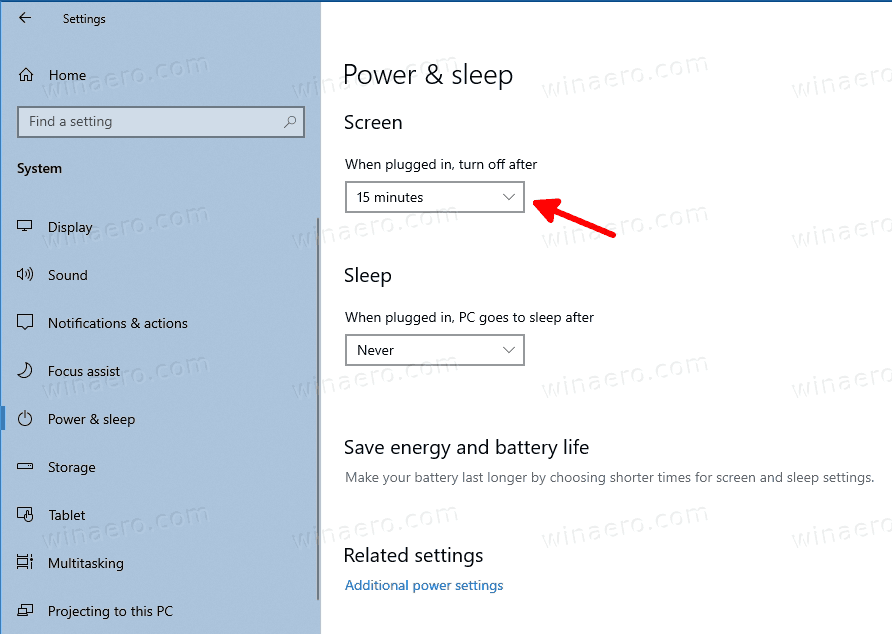
- Now you can close the Settings app.
Alternatively, you can Power Plan options.
Change Computer Sleep After Time in Power Plan
- Open Settings.
- Go to System - Power & sleep.
- On the right, click on the link Additional power settings.
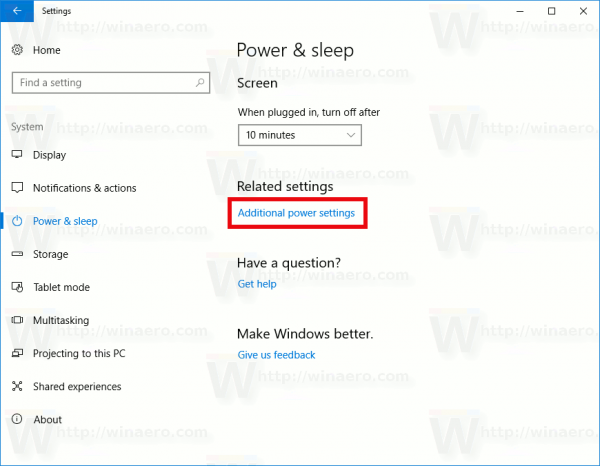
- The following dialog window will be opened.
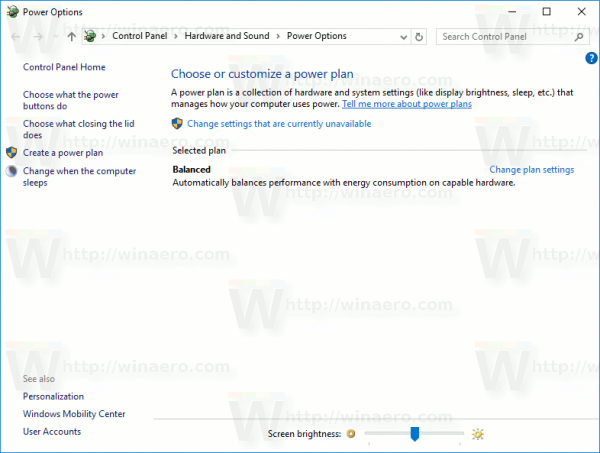
- On the left, click on Change when the computer sleeps.
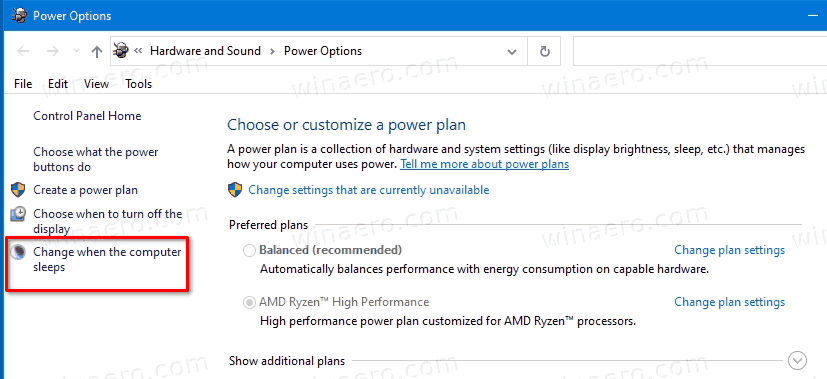
- Click on the link Change settings that are currently unavailable.
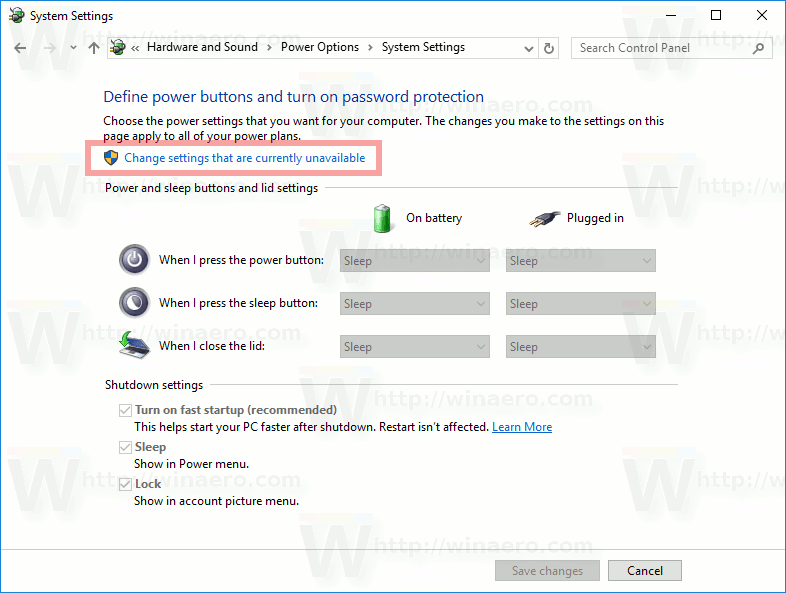
- On the next page, change the values for the Put the computer to sleep option in Plugged in and On battery options, and click on Save changes. The latter option appears when your device has a battery.
Also, it is possible to adjust the Sleep After time in Advanced Power Plan options.
Change Computer Sleep After Time in Advanced Power Plan options
- Open advanced settings of a power plan.
- Click on the link Change settings that are currently unavailable.
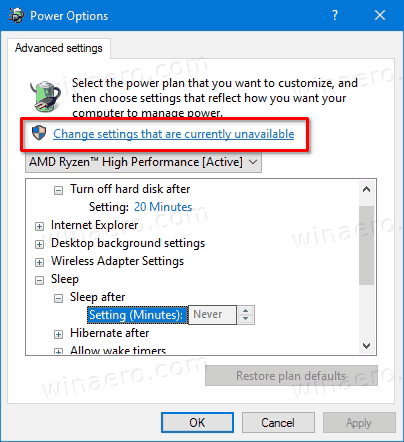
- In Advanced Settings, go to Sleep->Sleep after.
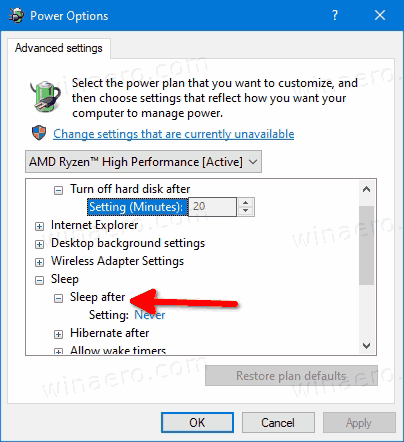
- Change the On battery and Plugged in values. Again, On battery appears on devices with battery.
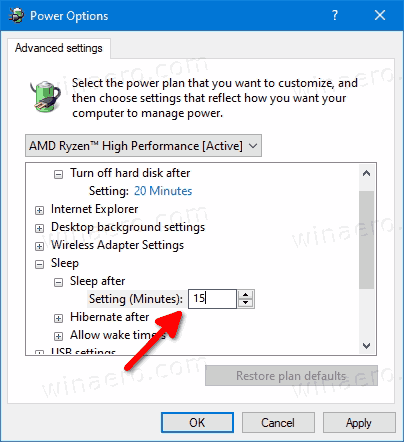
- Click on OK and you are done.
Finally, you can change the Sleep After time for the current power plan in the command prompt.
Change Computer Sleep After Time in Command Prompt
- Open a command prompt.
- Type or copy-paste the following command:
powercfg /SETDCVALUEINDEX SCHEME_CURRENT 238C9FA8-0AAD-41ED-83F4-97BE242C8F20 29f6c1db-86da-48c5-9fdb-f2b67b1f44da <seconds>. This command changes the value for the battery power. - The following command is for plugged in mode:
powercfg /SETACVALUEINDEX SCHEME_CURRENT 238C9FA8-0AAD-41ED-83F4-97BE242C8F20 29f6c1db-86da-48c5-9fdb-f2b67b1f44da <seconds> - Substitute the
<seconds>portion with the number of seconds for the Sleep After time.
You are done!
Related articles:
- Add System Unattended Sleep Timeout to Power Options in Windows 10
- Add Allow Sleep with Remote Opens Power Option in Windows 10
- Create Sleep Study Report in Windows 10
- How to Find Sleep States Available in Windows 10
- Disable Sleep Password in Windows 10
- Create Shutdown, Restart, Hibernate and Sleep Shortcuts in Windows 10
- Find which hardware can wake up Windows 10
- How to prevent Windows 10 waking from sleep
Support us
Winaero greatly relies on your support. You can help the site keep bringing you interesting and useful content and software by using these options:

Since you brought this basic function up….
I’ve got a old gatewway laptop on the kitchen table. I installed win 7 pro on it using the same physical disc I used for this pc then, then proceeded to updgrade it to win 10 for free. (yep, 2 for 1, and this was early this year)
It’s always plugged in because it has no battery installed. Anyways, when it is sleeping, it still generates alot of heat, so much that the cooling fan will kick on. What in the hell is it doing in the background while it is supposedly sleeping I wonder?
I’ve just started shutting it down as we have plenty of advance notice to turn it on before dinner.